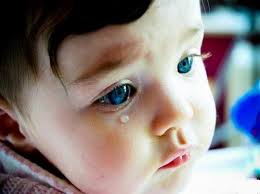weep
英 [wiːp]
美 [wiːp]
- vi. 哭泣;流泪;哀悼;滴落;渗出液体
- vt. 哭泣;流泪;悲叹;流出或渗出液体
- n. 哭泣;眼泪;滴下
使用频率:

记忆方法
1. 我因为太伤心了,两只小眼睛扑通扑通的掉眼泪。
中文词源
weep 哭泣
来自PIE*wab,哭泣,尖叫。
英语词源
- weep
-
weep: [OE] Weep goes back to prehistoric Germanic *wōpjan, which probably originated in imitation of the sound of wailing or lamentation. Most of its Germanic relatives have long since died out, but Icelandic still has ǽpa ‘cry out, scream’.
- weep (v.)
- Old English wepan "shed tears, cry; bewail, mounr over; complain" (class VII strong verb; past tense weop, past participle wopen), from Proto-Germanic *wopjan (cognates: Old Norse op, Old High German wuof "shout, shouting, crying," Old Saxon wopian, Gothic wopjan "to shout, cry out, weep"), from PIE *wab- "to cry, scream" (cognates: Latin vapulare "to be flogged;" Old Church Slavonic vupiti "to call," vypu "gull"). Of water naturally forming on stones, walls, etc., from c. 1400. Related: Wept; weeping; weeper.
权威例句
- 1. In severe cases, the skin can crack and weep.
- 在恶劣的条件下,皮肤可能会开裂并流脓。
- 2. Wonderfully melodic and tuneful, his songs have made me weep.
- 他的歌旋律优美、悦耳动听,让我潸然泪下。
- 3. There are times when I sit down and have a good weep.
- 有时候我会坐下来痛痛快快地哭一场。
- 4. She started to weep uncontrollably.
- 她不由自主地哭了起来。
- 5. Laugh and the world laughs with you, weep and you weep alone.
- 当你笑时,整个世界同你一起欢笑, 当你哭泣时,却只有你一人独自悲哀.
